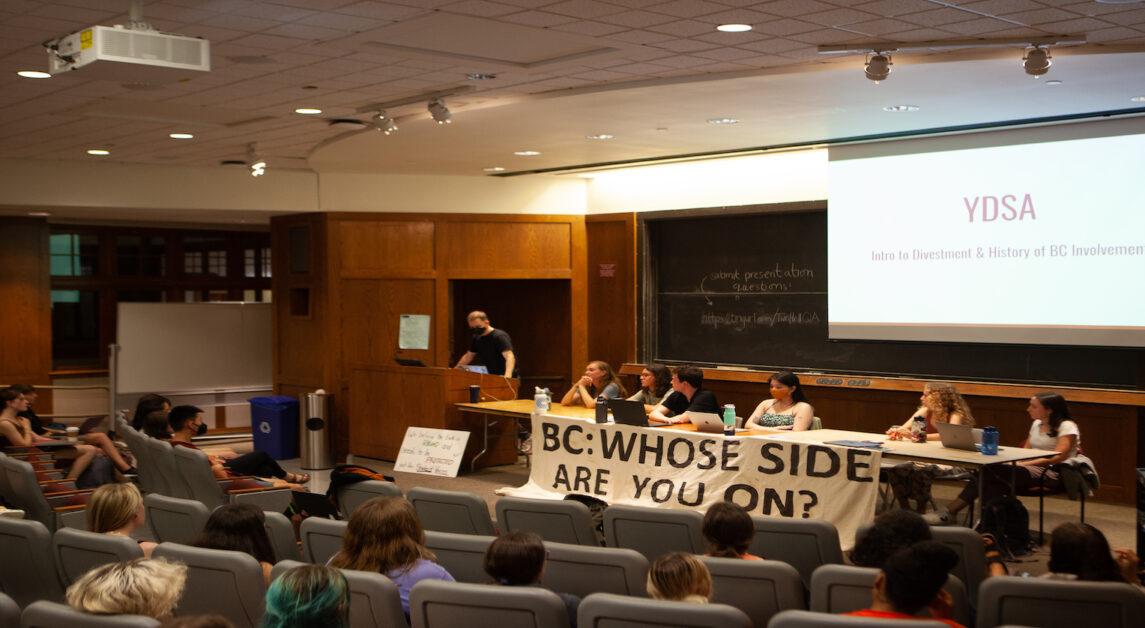In a Fulton Hall classroom on Wednesday night, a line of seven club leaders sat at a table facing a crowd of about 60 Boston College students. A banner reading “BC: Whose Side Are You On?” hung in front of the table below a line of reusable water bottles.
“What does BC say about itself?” said Nickolas Constantino, MCAS ’23 and action and events coordinator for Climate Justice at BC (CJBC). “It says it’s a Jesuit, Catholic institution. It says it cares for the whole person—cura personalis. It says it motivates the students to work for social justice, and things like that. All very positive things. BC says a lot of things about itself in words. But what kinds of things does BC say about itself with another form of communication: money?”
CJBC, alongside the Young Democratic Socialists (YDS) of BC, FACES, BC Students for Justice in Palestine (SJP), EcoPledge of BC, and Real Food BC, hosted a town hall to explain fossil fuel divestment and why they’re fighting for it. The idea is that BC should stop investing in fossil fuels because doing so contributes to climate change, and instead put its money toward investments that help the community, Constantino explained.
Though BC has not disclosed how much money it has invested in the fossil fuel industry, the University has reiterated its policy on divestment on multiple occasions—it does not think it’s an effective way to combat climate change.
But students are still concerned that the portion of BC’s 3.8 billion dollar endowment invested in fossil fuel companies is working to harm both the environment and those people most directly affected by climate change, including people of color and people with fewer resources.
SJP and FACES, an anti-racism club at BC, shared examples of divestment strategies that they say have worked to push back against the private prison industry and injustice in the Israeli-Palestinian Conflict.
Private prison and detention center CoreCivic has seen its stock price drop from $35 in February 2017 to about $9 today, according to FACES Events and Communication Co-Leader An Nguyen, CSOM ’22. Nguyen attributes this drop to investors’ growing unwillingness to loan money to these for-profit prisons on the grounds that they are unethical.
A strategy called BDS—boycott, divestment, sanctions—has become popular among activists trying to support Palestinians, according to SJP President Josh Fording, MCAS ’22. These efforts involve boycotting Israeli companies and products on an individual level, and then encouraging institutions and corporations to do their own kind of boycott—divestment.
The town hall was just meant to scratch the surface of the divestment movement, but Nguyen said they hope students gained a basic understanding of how racism, food justice, fossil fuels, and other big ideas all intersect.
“I think it went great,” Nguyen said. “The turnout is amazing. This is the first time we did it in a big room like this, and it was really good to see it filled.”
As divestment continues to make headlines, CJBC and the other clubs involved are hoping that events like the town hall will build on existing momentum.
“Since the semester started, Harvard, BU, University of Minnesota, Church of Ireland, California State University, Dartmouth, and Reed have all divested from fossil fuels,” Cecilia Durcan, CJBC vice president and MCAS ’23, said. “This is the importance of divestment. One institution says it’s wrong, more and more you see it snowballing into this effect where no one wants to have their money in these companies anymore.”
Featured Image by Steve Mooney / For the Heights







